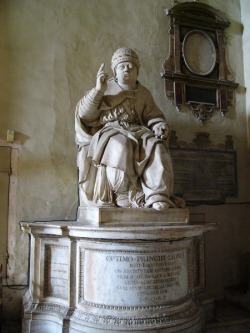The Legacy for Pope Leo (10)
Against the misconduct from some servants of the church, the Augustinian monk Martin Luther posted (31 October 1517) his famous ninety-five theses on the church door at Wittenberg which successively escalated to a widespread revolt against the church. Although Leo did not fully comprehend the importance of the movement, he directed (3 February 1518) the vicar-general of the Augustinians to impose silence on the monks. On 30 May Luther sent an explanation of his theses to the pope; on 7 August he was summoned to appear at Rome. An arrangement was effected, however, whereby that summons was cancelled, and Luther went to Augsburg in October 1518 to meet the papal legate, Cardinal Cajetan, who was attending the imperial diet convened by the emperor Maximilian to impose the tithes for the Turkish war and to elect a king of the Romans; but neither the arguments of the educated cardinal, nor the dogmatic papal bull of the 9th of November requiring all Christians to believe in the pope's power to grant indulgences, moved Luther to retract. A year of fruitless negotiation followed, during which controversy over the pamphlets of the reformer set all Germany on fire. A papal bull of 15 June 1520, which condemned forty-one propositions extracted from Luther's teachings, was taken to Germany by Eck in his capacity of apostolic nuncio, published by him and the legates Alexander and Caracciolo, and burned by Luther on 10 December at Wittenberg. Leo then formally excommunicated Luther by bull of the 3 January 1521; in a brief the Pope also directed the emperor to take energetic measures against heresy. On 26 May 1521 the emperor signed the edict of the diet of Worms, which placed Luther under the ban of the Empire; on 21 of the same month Henry VIII of England sent to Leo his book against Luther on the seven sacraments. The pope, after careful consideration, conferred on the king of England the title "Defender of th Faith" by bull of 11 October 1521. Neither the imperial edict nor the work of Henry VIII halted the Lutheran movement, and Luther himself, safe in the solitude of the Wartburg, survived Leo X.
sources:
http://en.wikipedia.org/wiki/Pope_Leo_X
http://en.wikipedia.org/wiki/Image:Ara_Coeli_(12).JPG

